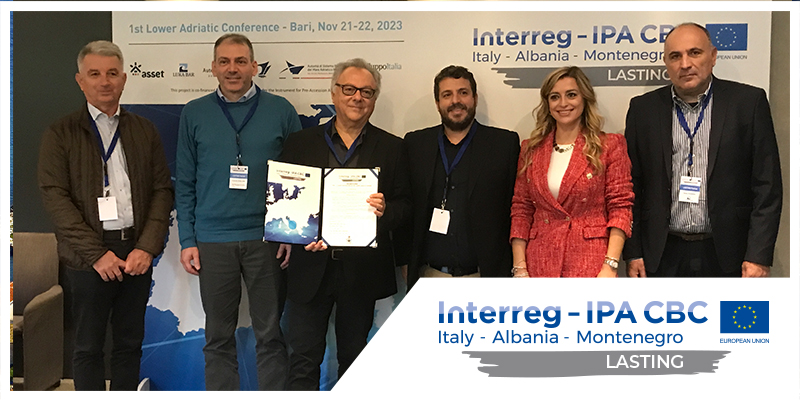
"The sea unites the countries it separates": Puglia, Albania, and Montenegro signed a moral commitment in Bari to continue collaborating in the development of an increasingly interconnected Lower Adriatic.
Bari, November 22, 2023 – The development and enhancement of connections between Puglia, Albania, and Montenegro were the focus of a two-day event organized by Asset, thanks to the Lasting Project funded by Interreg IPA CBC Italy-Albania-Montenegro.
Numerous experts from the European Union, particularly from Montenegro, Albania, North Macedonia, Bulgaria, as well as representatives from the Italian Presidency of the Council and the regions of Puglia and Molise, gathered in Bari to discuss issues and solutions related to the Adriatic Sea and transportation between its shores.
"The Lasting project has revitalized the theme of Pan-European Corridor VIII with the overall goal of promoting regional coordination and streamlining passenger flows in the Lower Adriatic area and the Trans-European Transport Network (TEN-T)," emphasized Giuseppe Garofalo, Asset's Project Manager. "The partnership, composed of Asset, the Southern Adriatic Sea Port Authority, Durres Port Authority - Albania, Luka Bar Akcionarsko Društvo Bar (Bar Port Joint Stock Company) - Montenegro, and Sviluppo Italia Molise S.p.A., the Regional Development Agency of the Molise Region, worked together for 18 months to share a strategic plan for the Integrated Passenger Mobility System of the Lower Adriatic and a process for smart integration of the involved international ports."
During the event, two works were presented: a technical study by Matteo Apollonio from the Southern Adriatic Sea Port Authority for improving cooperation between the Ports of Bari, Bar, and Durres, aiming to harmonize equipment and related software necessary to facilitate and expedite the boarding and disembarking process in the international ports of the Lower Adriatic and reduce transit times. The research on passenger flows between the two shores of the Southern Adriatic, conducted by Alessandro Rubino and Claudia Capozza from the University of Bari Aldo Moro, revealed an interesting fact: passenger traffic in Albanian ports increased from around 1,120,000 passengers to 1,574,000 (from 2010 to 2020 - pre-COVID), with an average annual growth of 4%, while air traffic from 2020 to present increased from 19,024 to 79,905 (+60,000 passengers) + 50.4%.
The proposal for the establishment of the "Corridor 8 Euroregion," following the European model of European Groupings of Territorial Cooperation (EGTC), was positively commented on by Slaven Klobučar, Policy Officer of the European Committee of the Regions, who coordinates the European register of EGTCs, speaking from Brussels for the conference.
During the working session led by Massimo Lupis d’Urso, an expert in internationalization processes, Puglia and Molise, along with Albania, North Macedonia, and Bulgaria, shared the proposal to create a European legal entity capable of attracting projects and funding to create an innovative and effective system of road, maritime, railway, and air transport between these territories, in line with the procedural guidelines outlined by Antonio Travascio from the Presidency of the Council of Ministers.
Aurora Losacco, Project Officer of the Joint Secretariat of the Interreg IPA CBC Italy-Albania-Montenegro Program, intervened at the event, presenting the new IPA South Adriatic Cooperation Program and highlighting the opportunity to capitalize on the Lasting project in the upcoming period 2021-2027. Vito Antonio Antonacci, Head of the Transport Department of the Puglia Region, illustrated the variety of regional transport projects and their continuity with the strategic Connectivity project, for which the Puglia Region leads in partnership with ASSET.
The day concluded with the partners from Puglia, Molise, Albania, and Montenegro signing a moral commitment to continue collaborating in the development of an increasingly interconnected Lower Adriatic, aiming to build effective yet intangible bridges across the Adriatic Sea.
